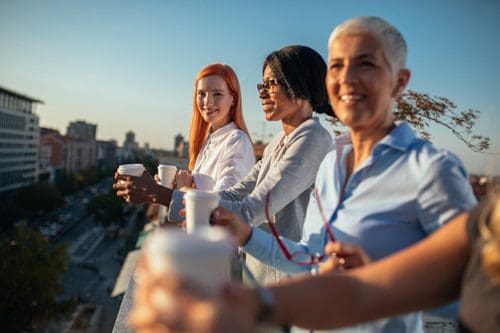 If you are in recovery and looking for ways to maintain your sobriety, having a trusted sponsor is a necessity. A sponsor is someone who has experience being sober and can offer mentoring throughout your recovery. A sponsor should be someone you feel comfortable with and who talks to you without judgment.
If you are in recovery and looking for ways to maintain your sobriety, having a trusted sponsor is a necessity. A sponsor is someone who has experience being sober and can offer mentoring throughout your recovery. A sponsor should be someone you feel comfortable with and who talks to you without judgment.
Why You Need a Sponsor in Recovery
Navigating life sober after going through treatment and entering into recovery can often be a challenge. Doing it alone can be difficult. Having a trusted sponsor can help you find success in your newly sober lifestyle and provide you with tools to prevent relapse.
Some reasons why a sponsor is needed in recovery are:
- Accountability. A sponsor can hold you accountable and make sure you are doing everything necessary to maintain your sobriety.
- Experience. A sponsor can share their personal experience and let you know what has worked or not worked for them in maintaining sobriety.
- Trust. Having someone you trust can make a difference in how you make decisions. If you feel like you are about to take a drink, you can call your sponsor to get help making a better decision.
- Guide. A sponsor will guide you through the 12-step program and help you understand each step. They will give you suggestions and support as you go through each step of the program.
Tips on What to Look for in a Sponsor
Choosing a sponsor can be an important part of recovery. If you attend a 12-step meeting such as Alcoholics Anonymous or Narcotics Anonymous, you may find someone at the meeting who is willing to sponsor you in the program. Some tips to consider when looking for a sponsor include:
- Choose a sponsor of the same sex. Men generally work out better when they sponsor men and women when they sponsor women. If you are gay or lesbian, you may want to choose a sponsor of the opposite sex. The point here is to work with someone toward whom you are unlikely to feel sexual attraction.
- Find someone with a similar background and experience. Sharing a common background or life experience can help you feel supported in your specific recovery experience.
- Don’t rush. You may not find someone immediately. Be open to talking to several people until you find the person you feel most comfortable with.
- Ask for recommendations. Others who attend your meeting or program may offer suggestions on sponsors or introduce you to someone who is open to sponsoring someone new.
- Make sure they have enough time. Many sponsors already work with several people or have family or job-related commitments. Look for someone who is easily available and will have time for you if you need to reach out to them for support when you are struggling. Most sponsors will not only meet one-on-one but will also be available for phone calls.
- Find someone you admire and that you see as a role model. Look for a sponsor with qualities you look up to and admire. You may want someone who has an obligation to their faith, family, and friends. A good role model will have qualities you desire and strive for.
- Look for someone you feel free to discuss things with that you may not want to discuss in a meeting setting. Your sponsor should be someone you can confide in without fear of judgment.
- Find a sponsor who genuinely cares about you and your sobriety. Feeling like your sponsor is invested in your journey can often make a difference.
What to Do if It Isn’t Working Out
If you have chosen a sponsor who is no longer working out or whom you do not feel comfortable with, you have the choice to select another person who may be better suited to your needs. Be honest with your sponsor if it is not working out. They may be feeling the same way as well. You can talk to others in your meeting until you find the right person for you. You will also want to be aware of any warning signs of relapse that your sponsor may show. If you see them struggling or having a relapse, they may not be the person for you.
Continuing and After Care Resources
At Twin Lakes Recovery Center, we offer an extensive continuing care and aftercare network consisting of 12-step meetings, outpatient programs, relapse prevention programs, and more. In addition, we offer alumni groups and events that provide opportunities to connect with others in recovery.
To find out more about what recovery programs and resources Twin Lakes Recovery Center has to offer, contact one of our addiction specialists today.



